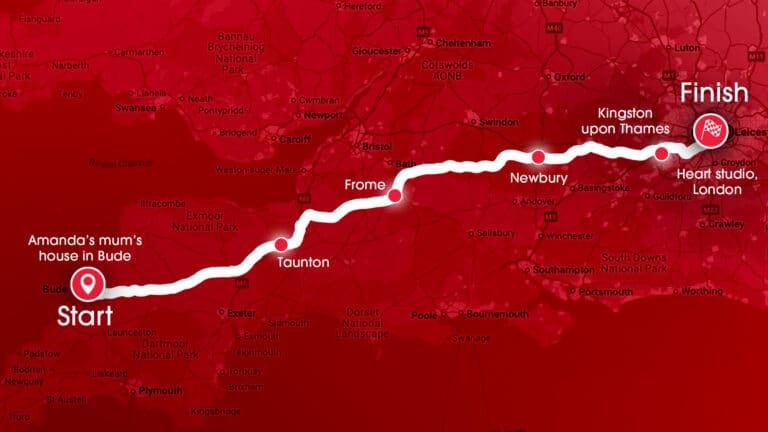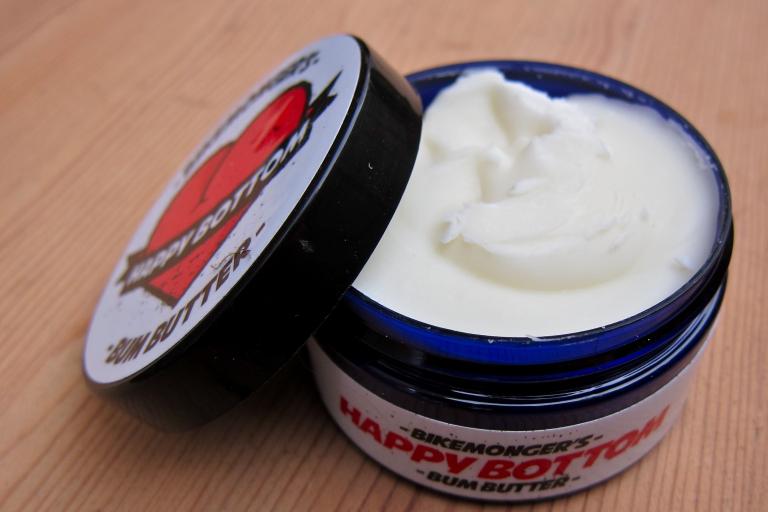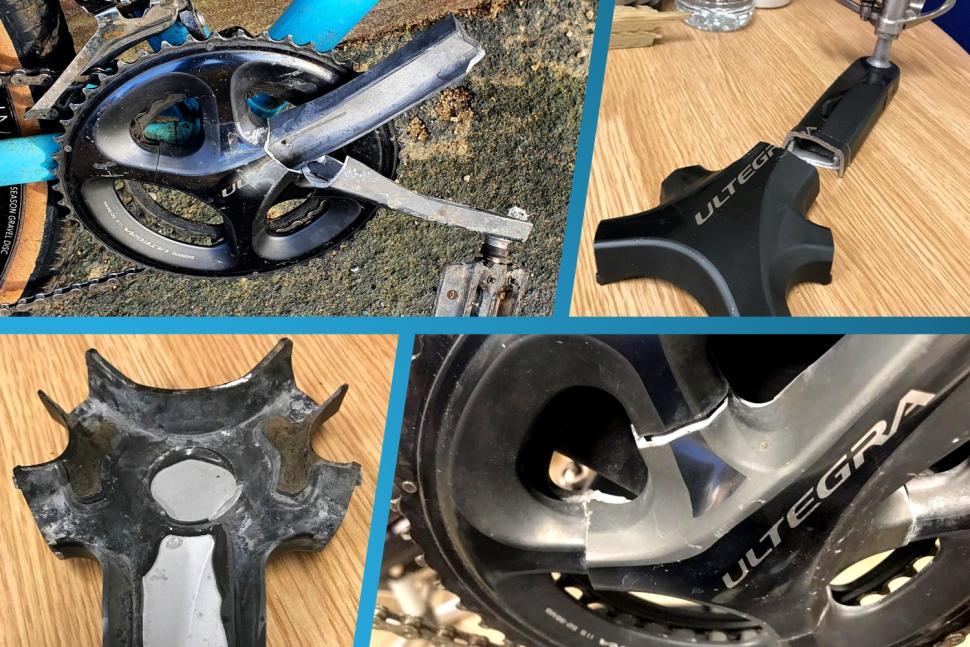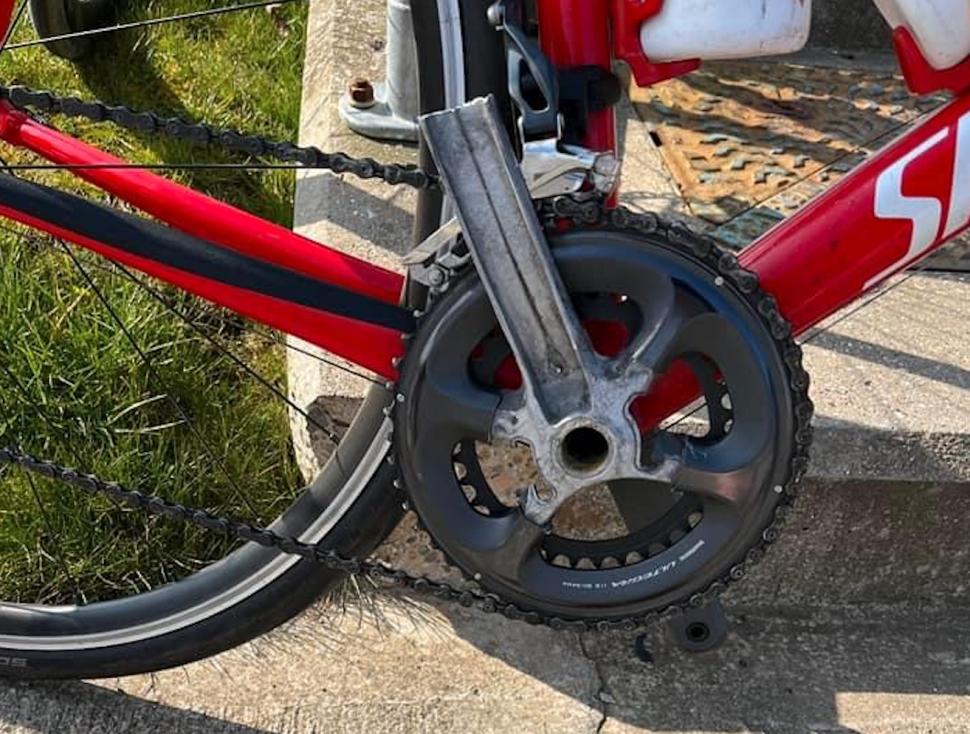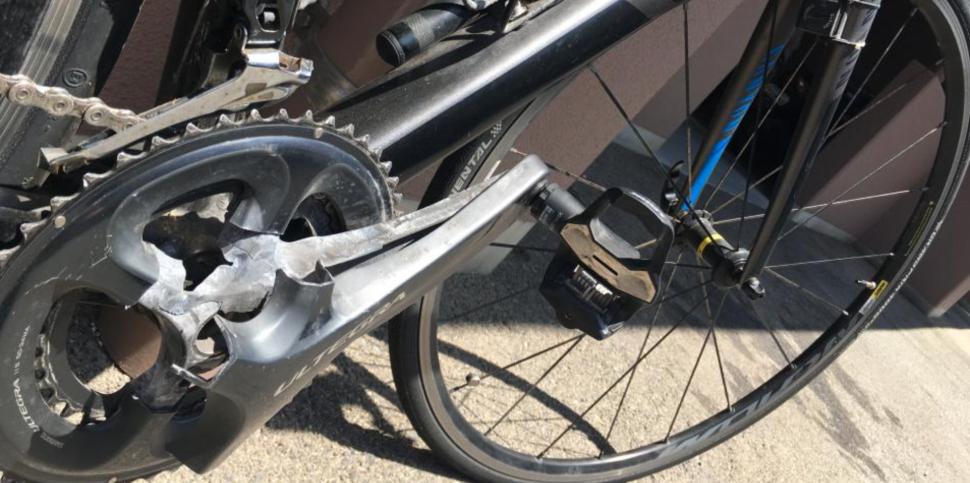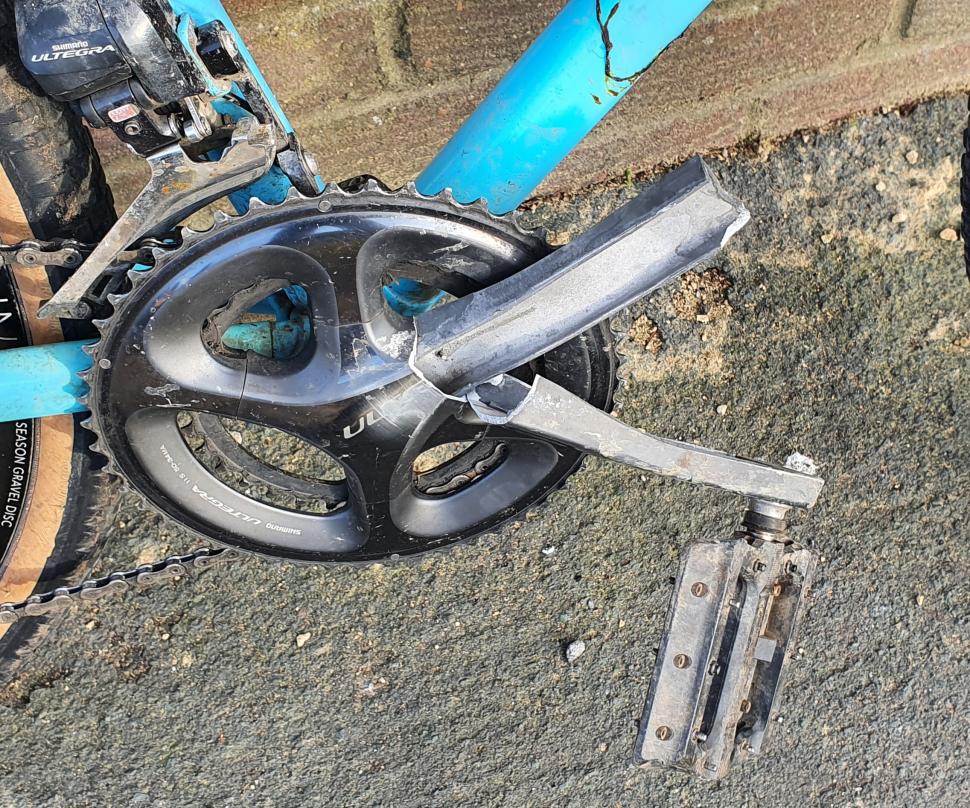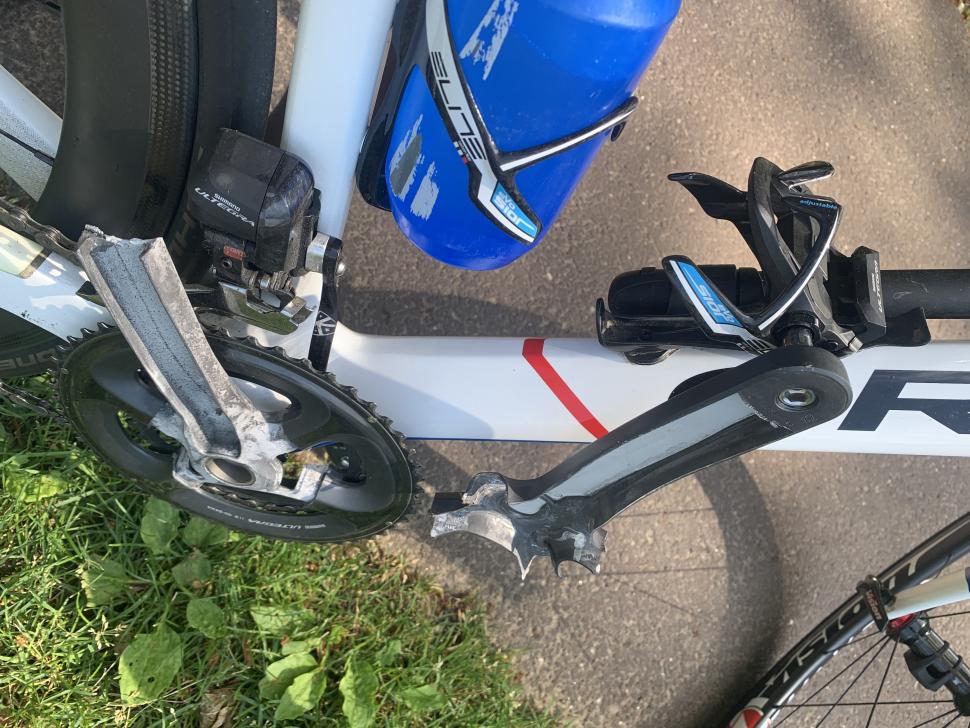- News
- Reviews
- Bikes
- Accessories
- Accessories - misc
- Computer mounts
- Bags
- Bar ends
- Bike bags & cases
- Bottle cages
- Bottles
- Cameras
- Car racks
- Child seats
- Computers
- Glasses
- GPS units
- Helmets
- Lights - front
- Lights - rear
- Lights - sets
- Locks
- Mirrors
- Mudguards
- Racks
- Pumps & CO2 inflators
- Puncture kits
- Reflectives
- Smart watches
- Stands and racks
- Trailers
- Clothing
- Components
- Bar tape & grips
- Bottom brackets
- Brake & gear cables
- Brake & STI levers
- Brake pads & spares
- Brakes
- Cassettes & freewheels
- Chains
- Chainsets & chainrings
- Derailleurs - front
- Derailleurs - rear
- Forks
- Gear levers & shifters
- Groupsets
- Handlebars & extensions
- Headsets
- Hubs
- Inner tubes
- Pedals
- Quick releases & skewers
- Saddles
- Seatposts
- Stems
- Wheels
- Tyres
- Health, fitness and nutrition
- Tools and workshop
- Miscellaneous
- Tubeless valves
- Buyers Guides
- Features
- Forum
- Recommends
- Podcast
news
"I found a crack in the market and filled it": Bum Butter cycling chamois cream enjoys "dream" spike in sales... after Amanda Holden gave brand a shout-out ahead of charity cycle; Shimano 'crankgate' rumbles on + more on the live blog
SUMMARY
 Amanda Holden Big Ride to Work charity cycle (Heart Radio)
Amanda Holden Big Ride to Work charity cycle (Heart Radio)10 October 2024, 09:41
"I found a crack in the market and filled it": Bum Butter cycling chamois cream enjoys "dream" spike in sales... after Amanda Holden gave brand a shout-out ahead of charity cycle
"It all started when I woke up to a text telling me 'Hey mate, you are all over Amanda Holden's bum'… complete with some screen shots from The Sun online. Blimey!"
Bum Butter owner Charlie Hobbs has had quite the week, his chamois cream business being catapulted to fame by some comments Amanda Holden made ahead of her charity cycle this week.
Charlie explained: "Then my wife passed me her phone with a Good Morning Britain TV interview with Amanda and Bum Butter. Then the story was picked up by countless news outlets 'Amanda Holden smothers herself in Bum Butter'… and just like that Bum Butter is now a household brand name."
In an entertaining blog piece on Bum Butter's website, Charlie asks how does the "mega turbo publicity benefit a small niche business"?
"This is dream marketing, this is off the scale, this is what every small business wishes for… or is it? It is. Website traffic is up, and sales are up. But it was very short lived. 'Today's news is tomorrows fish n chip paper' is an old saying from when old newspapers where used to wrap your fish n chips… and it is very true. I rode the Holden wave and it is now fading away. The chart below clearly illustrates 'Holden's Spike', and you can see what seems to be a sales tail, in grey."
"This got me thinking…. How much would it costs for TV news, celebrity endorsement, and a double page story in The Sun? How much would this publicity cost if you were to buy it? I don't know, but it could be £100-£300k. That is a guess. What was it worth to Bum Butter? A very welcome surge in sales… and hopefully a nice step up in brand awareness that will help in the longer term. Just so you know. This publicity was not requested, paid for, or even known about until it happened."
And in an amusing twist, Charlie's on Heart this morning talking to Holden about the product... "Whoop whoop…. The Bum Butter media rollercoaster ride is back on. This time next year Rodney…"
Presumably Cycliq or other camera brands won't be getting the same treatment...
10 October 2024, 16:31
"Unfair" Cycle to Work scheme "problems" need to be addressed, admits government minister
10 October 2024, 14:56
The Netherlands win European Bike Mechanics Championship
Jelmer Bijvang, Berend Bervoets and Kevin Smit have been crowned European Bike Mechanics Championship winners, representing the Netherlands. The Shimano-organised competition saw the participants "demonstrating their technical prowess, clear communication and teamwork, their ability to quickly identify and fix complex mechanic issues". Italy were second and Germany third. According, to Shimano the tests included:
- 'Drivetrain Setup': (Installing a SHIMANO CUES front crank, choosing and installing a cassette that is compatible for the CUES drivetrain; fine-tuning the front and rear derailleurs using E-TUBE PROJECT Cyclist to customize SHIMANO ULTEGRA Di2 shift buttons)
- 'Wheel maintenance': (Servicing a freehub, replacing the freehub body and performing a brake bleed)
- 'Hub Gear Maintenance': (Disassembling, cleaning and reassembling SHIMANO NEXUS internal hub gear)
No word yet on if the tiebreaker round in case of a draw would have been full crank inspection...
10 October 2024, 15:48
George Hill doesn't hold back in his latest opinion piece... Boris Johnson, Tadej Pogačar and Taylor Swift are the same person, apparently... the problem with calling all cyclists 'Cyclists'
10 October 2024, 14:47
Excuse me?
This gem from St. Louis remains the king of scary bike lanes. pic.twitter.com/YGTJVksG5y
— Peter Flax (@Pflax1) October 9, 2024
10 October 2024, 15:08
Mark Cavendish set to race for final time as a professional in November at Tour de France Singapore Criterium, organisers ASO confirm
10 October 2024, 14:35
Works to treat "increasingly severe rainfall" flooding on Bath's Two Tunnels path to begin this week
Great to see the Two Tunnels route will reopen in the near future https://t.co/RJW9axEh3R
— Laura Laker (@laura_laker) October 10, 2024
The BBC has reported that Bath & North East Somerset Council is to install a pump at the entrance to the Devonshire Tunnel in Bath with the aim of diverting flood waters.
Flooded by "increasingly severe rainfall", the eight weeks of work is being carried out on behalf of Sustrans, with the hope that the popular active travel route will be flood-proof afterwards.
"The original Victorian drainage in the Devonshire Tunnel has not been able to withstand the increasingly severe rainfall we have experienced in recent years," Councillor Paul Roper said. "These essential works to install a pump will future-proof the route and ensure that it can remain open throughout future weather events. This is an important route for both commuting and pleasure and we apologise for the inconvenience while the works are carried out, however this is a long-term fix that needs to be done."
10 October 2024, 13:12
Zoe Bäckstedt defends Simac Tour lead without any teammates
At 20 years of age, Zoe Bäckstedt is leading the Simac Tour, a Women's WorldTour stage race in the Netherlands, heading a classy field including world champ Lotte Kopecky, Lorena Wiebes, Elisa Balsamo, Elisa Longo Borghini and a whole host of established experienced pros.
Today's third stage, won by Wiebes, saw Bäckstedt maintain her race lead, a feat made even more impressive when you consider this is the extent of her Canyon//SRAM Racing team at the event...
🚴♀️En nog helemaal alleen over. Blessures en ziekte decimeerden de ploeg van leidster @Backstedt_Zoe @WMNcycling. Kan ze stand houden vandaag.#SLT2024 pic.twitter.com/BCKXh7H0Uq
— Simac Ladies Tour (@ladiestour) October 10, 2024
Yep, in a bizarre turn of events, all four of her teammates have abandoned, a grim mix of illness, injuries and crashes leaving Bäckstedt leading a one-woman charge against the WorldTour peloton.
Soraya Paladin and Maike van der Duin are out through illness, while fellow Brit Alex Morrice was unable to finish yesterday's stage. Then there's Chloé Dygert who broke her nose after walking into a door...
It all means Bäckstedt has three more days to defend the jersey alone, two flat stages followed by a punchy circuit in Arnhem on Sunday.
10 October 2024, 13:03
RideLondon "hiatus" for 2025 due to opening of "car use-encouraging" tunnel, suggests FOI request, after London's walking and cycling commissioner objected to closure of new tunnel for cycling event as "absolute no"
10 October 2024, 10:44
Cav and Wiggo to ride Gran Fondo Hincapie to raise money for US hurricane relief
Knights of the Realm Sir Mark Cavendish and Sir Bradley Wiggins are to ride the Gran Fondo Hincapie next weekend to raise money for the US hurricane relief efforts. Jan Ullrich is also expected to be on the startline, Rich Hincapie (president of Hincapie Events) explaining how they went from likely cancelling the sportive to using it for good...
" I realised that we could use the Gran Fondo to draw attention to the massive devastation in our area and turn the whole thing into a huge fundraising effort," he said. "While we understand that many counties are in need, we want to focus on our neighbours in Polk County who have partnered with us and supported our Gran Fondo event for thirteen years. We want to rally the global cycling community and really make a difference in Polk County. Our goal is to raise one million dollars."
10 October 2024, 11:17
10 October 2024, 09:18
Kasper Asgreen joins EF Education-EasyPost
EF Education Easy-Post have beefed up their classics line-up, adding Kasper Asgreen to the ranks for next season. The Dane hasn't enjoyed a vintage 2024 but hopes to be revitalised by a move to "really cool" EF after seven seasons with Soudal Quick-Step, during which he won the Tour of Flanders, E3 Saxo Bank Classic, Kuurne-Brussel-Kuurne and a stage of the Tour de France.
"The main reason for me to come to this team is the way that the guys race," Asgreen said of the move. "You can see that there's always a plan to try to win. Even if the race is not perfectly suited to them, the guys won't just sit in the bunch, waiting for the other teams to take charge. That really attracted me. On this team, we're going to do everything that we can to make races develop the way we want them to develop. That is really, really cool. For me, it’s the main thing: I like the team's approach to racing."
A statement signing for EF who lost their former classics headliner Alberto Bettiol to Astana in August.
10 October 2024, 08:58
10 October 2024, 08:27
BBC admits 15,000mph tailwind error...before we all go KOM-hunting
You might have got a shock opening your weather app this morning...
Unfortunately for anyone looking to bag a few wind-assisted KOMs, the BBC quickly addressed the data fault, and confirmed very earnestly that the 404°C temperatures forecast in Hottingham (sorry, that's Nottingham) are not legit.
"Don't be alarmed folks — Hurricane Milton hasn't made it to us here in the UK! There's been a data glitch between our suppliers and the app/online. Folk are working to solve the issue," weather presenter Matt Taylor confirmed on social media, before the BBC Weather press office confirmed the fault in a slightly more serious statement...
10 October 2024, 07:55
Crank inspections back in the spotlight as cyclists despair at Shimano's approach... but not everyone has sympathy for bike shop "banned" from inspection programme
You might have seen, crank inspections and Shimano are back in the news. That's because yesterday we shared this piece on a Lake District-based bike shop that claimed in an online video that it had been "banned" by the components giant due to failing 100% of them.
Very YouTube-friendly language of course, the "ban" relating to Mapdec Cycle Works no longer being paid the £35 Shimano is giving bike shops for each time they look at customers' cranks as part of the "inspection and replacement" programme. Why? Well, Mapdec believes it is due to its 'fail rate', or at least its 'not pass rate' being 100 per cent (the bike shop refusing to pass any and sending them all back to Shimano for a second opinion).
Some added context to all this is that a few days before Shimano's UK distributor Madison got in touch to reveal the news, Mapdec had uploaded another video, in which owner and founder Paul Vousden said: "We don't bother inspecting them, we just ship them back, it seems to be the industry norm on all the bike and mechanic forums that we follow, they all just say just ship them back, get a new set."
It's this additional detail that left some reacting to our story with little sympathy for the bike shop, even if many accept the moral argument to Mapdec's stance — and almost all believe Shimano should have simply ordered a full recall last September and replaced everyone's cranks, not just asked customers to keep riding and get a mechanic to inspect them when they suspect something has gone wrong.
john_smith: "Doesn't Shimano issue instructions on how the inspections are supposed to be done and what constitutes a pass or fail? If Shimano pays shops to do given checks in a given way and fail/pass the parts in accordance with given criteria, then a shopkeeper can hardly complain if he gets 'banned' for doing something different (which I presume is what is happening here)."
That sentiment was echoed by other comments too. Yes, Shimano does issue instructions, a summarised version of the scintillating 36-page dealer's manual in the original story.
From Mapdec's perspective, Vousden admitted they do inspect them properly, filling in the form, doing all the checks, cleaning the cranks, and taking the photos required. But, they won't 'pass' any...
"It asks us, inspection passed or failed?" he continued. "There's no in between. It's a pass or a fail, so our policy has always been if it's clearly failed, it's obvious, it's a fail. But we would never write the word 'pass', we would always write something like 'customer reports creaking, customer not happy with the pass, unsure, please check'. So we thought that we'd send them off to Shimano and Shimano would then offer a second opinion.
"Our policy was always we don't want to be the one that says this is a pass, we always thought that, even though Shimano gave a liability release, that liability release in our mind wasn't strong enough. Also we had customers coming up to us and saying: 'Well how do I know it's safe?' They'd come back the week later and say: 'Can you inspect it again it's still creaking? I'm not convinced this is not going to fail... I want a new one, I'm just going to keep coming back every week until you fail it'.
"I've always always put our customers first and I've never thought I'm going to be on the side of Shimano here."
And while some comments under our piece have little sympathy for the "ban" considering the context of what was claimed previously, it's fair to say the underlying feeling is that all this would have been avoided if Shimano had simply ordered a full recall last year...
NickSprink: "I watched the vid when Mapdec released it, and I completely agree with their approach. They are not materials engineers, they don't have the ultrasound and X-ray equipment to establish this sort of issue (like the airline industry uses). A visual inspection and listening for 'creaks' cannot be sufficient. If I had one of the cranks listed, I would expect a full replacement. Anything else I would consider a fob off, and be very disillusioned."
EK Spinner: "[Quoting the story] mechanics are required to undertake a process of inspecting and cleaning. The recall of last September is for 11-speed Hollowtech II road cranksets that were produced between 1 June 2012 and 30 June 2019, and covers the model numbers: Ultegra FC-6800 and FC-R8000, and Dura-Ace FC-9000, FC-R9100, and FC-R9100-P."
"That should be the end of the process for the bike shop, the next line should be 'Once a relevant crankset has been identified, bike shops are asked to return the chainset to Shimano'."
> "It's a bit of a mess": A solicitor's take on Shimano crankgate on our latest Podcast
Legin: "You may agree or disagree with the approach of Shimano to this issue. However this Bike Shop publicised that they were not following the process that they were taking the money for."
Mr Anderson: "The clear and important issue is that, a crank may pass one inspection, but that does not guarantee that crank is defect free, it can still fail sometime in the future. As the video pointed out, the shareholder had this very experience. Mapdec is putting the customer first. All cranks should be shipped back to Shimano for them to inspect, and issue a warranty they are safe to use."
If only there was a way this whole inspection programme could have been avoided...
Dan is the road.cc news editor and joined in 2020 having previously written about nearly every other sport under the sun for the Express, and the weird and wonderful world of non-league football for The Non-League Paper. Dan has been at road.cc for four years and mainly writes news and tech articles as well as the occasional feature. He has hopefully kept you entertained on the live blog too.
Never fast enough to take things on the bike too seriously, when he's not working you'll find him exploring the south of England by two wheels at a leisurely weekend pace, or enjoying his favourite Scottish roads when visiting family. Sometimes he'll even load up the bags and ride up the whole way, he's a bit strange like that.
Add new comment
36 comments
Steve K
|
2 months ago
3 likes
Apropos nothing, really, I just saw this on twitter and thought it worth sharing. Obviously from the US - we don't have jay walking here - but it would be good to see this sort of attitude to drivers' responsibilities from the judiciary more generally.
https://x.com/PeterNorton12/status/1844371092665950270

brooksby
|
2 months ago
1 like
Water pump to solve tunnel flooding on cycle route
https://www.bbc.co.uk/news/articles/cz7j8nvxvr4o
Works to resolve flooding on a well-travelled cycle route have begun this week.
Bath & North East Somerset Council is installing a pump at the entrance to the Devonshire Tunnel in Bath, which forms part of the Two Tunnels path.
The pump will divert flood water uphill to bypass the original Victorian cast iron pipework, which was once used to drain water away from the railway line.
The work is being carried out on behalf of the cycling charity Sustrans, who own and manage the route, and is expected to take eight weeks to complete.

GMBasix
|
2 months ago
9 likes
Was this ninja ambulance even wearing hi-viz or a helmet?
Sometimes they bring it on themselves.


EddyBerckx
|
2 months ago
10 likes
I remember Amanda Holden laughing uncontrollably with glee at a Britains got talent contentant's "comedy" rant at cyclists - the usual bingo stuff.
Wonder how she'll react if she gets a 10th of the hate normal cyclists do on her 250 mile ride? Hate that's shes contributed to.

Hirsute
|
2 months ago
6 likes
Was cycling on some side streets yesterday, came round a bend to find some bloke standing in the middle of the road with his back to me, staring at his phone.
Me: Great place to stand mate
Him: I'm working
Me: Don't you follow safe working practices then?
Me: Don't you do a risk assessment which determines your working practices ?
His mate was standing on the pavement level with him - didn't stand around the bend.
No Hi Viz either ! Practically invisible !!
mitsky
|
2 months ago
1 like
"Murderer who drove stolen car into cyclist jailed"
https://www.bbc.co.uk/news/articles/cvg3v882ppno
Another case where loss of libido and taste buds might be a good deterrent.

Given the actual hurricane in Florida, it seems suspicious that the BBC app (which, incidentally, has never been very reliable after they dumped the Met Office and went with a different provider, IMO) is now warning of hurricanes here…
They'd never admit it, but who else thinks they got hacked?
Given the actual hurricane in Florida, it seems suspicious that the BBC app (which, incidentally, has never been very reliable after they dumped the Met Office and went with a different provider, IMO) is now warning of hurricanes here…
They'd never admit it, but who else thinks they got hacked?
They're just part of the Big Wind conspiracy

https://www.theguardian.com/us-news/2024/oct/07/marjorie-taylor-greene-h...
Far-right congresswoman Marjorie Taylor Greene is facing condemnation following several conspiratorial comments amid the devastation of Hurricane Helene that seemed to suggest she believed the US government can control the weather.
In a post last week shared with her 1.2 million X followers, the US House representative from Georgia wrote: “Yes they can control the weather. It’s ridiculous for anyone to lie and say it can’t be done.”

Presumably the members of the US government all grew up playing D&D?
https://www.dndbeyond.com/spells/2050-control-weather
..and the reason they shut down Wilhelm Reich's efforts in this regard was to maintain their monopoly? (Fortunately resulting in a good song at least).
Presumably the members of the US government all grew up playing D&D?
https://www.dndbeyond.com/spells/2050-control-weather
..and the reason they shut down Wilhelm Reich's efforts in this regard was to maintain their monopoly? (Fortunately resulting in a good song at least).
Wilhelm Reich had some interesting ideas which annoyed quite a few people. He's the classic example of book burning in the U.S.A.
He met up with Einstein and even left Einstein with one of his orgone accumulator machines, but after some investigation, he must have decided that Reich was a bit of a crank and refused to take his calls afterwards.

Well... he was a crank, and on inspection was (by the standards of the day even) cracked! (Although his personal magnetism was clearly remarkable - seems to be hard to bottle that though).
I think today people would be more concerned about his "coercive control" than the "quack doctor" aspects and promotion of orgasm (and anti-authoritarian stance) which seemed to have triggered the US authorities.

Presumably the members of the US government all grew up playing D&D?
https://www.dndbeyond.com/spells/2050-control-weather
..and the reason they shut down Wilhelm Reich's efforts in this regard was to maintain their monopoly? (Fortunately resulting in a good song at least).
I suspect that Taylor-Greene is more likely to be one of the people who were saying that D&D players were all Satanists or something…
I suspect that Taylor-Greene is more likely to be one of the people who were saying that D&D players were all Satanists or something…
And yet her initials are the same as Magic The Gathering?
She's probably busy trying to escape oversight by the Gazpacho Police (https://www.snopes.com/fact-check/gazpacho-police/). Presumably they watch over the stock market.

I suspect that Taylor-Greene is more likely to be one of the people who were saying that D&D players were all Satanists or something…
And yet her initials are the same as Magic The Gathering?
She's probably busy trying to escape oversight by the Gazpacho Police (https://www.snopes.com/fact-check/gazpacho-police/). Presumably they watch over the stock market.
And don't forget trying to keep out of range of the Jewish Space Lasers
https://nymag.com/intelligencer/article/marjorie-taylor-greene-qanon-wil...


I'd rather rely on the Met Office, I've not been impressed with BBC weather info since parting company with them. Forecast for St George's:
https://www.metoffice.gov.uk/weather/forecast/gcnhwrck8
Naturally there is an app and I like their Youtube channel. Though it feels like they occasionally exaggerate the intensity or the area covered by extreme weather warnings; I am tempted to think that it's a legacy of the 1987 Great Storm, famously downplayed by Michael Fish on BBC TV beforehand, though there's a good Met Office article about that:
https://www.metoffice.gov.uk/weather/learn-about/weather/case-studies/gr...


Has BBC weather ever been acurate? I can't remember a time when it was. Gave up years ago. Met Office not great, but far better than the BBC.
It used to be more accurate up to 2018 because it got its forecasting information from the Met Office. When it gave the contract out to Meteogroup, now owned by a private American company concerned with global forecasts, it was patently obvious that the quality was going to be lower than a dedicated expert UK government agency. It's interesting that the BBC still uses the Met Office forecasts for the shipping forecast, which would appear to be a tacit admission that Met Office forecasts are still the gold standard for when it really matters.
Has BBC weather ever been acurate? I can't remember a time when it was. Gave up years ago. Met Office not great, but far better than the BBC.
It used to be more accurate up to 2018 because it got its forecasting information from the Met Office. When it gave the contract out to Meteogroup, now owned by a private American company concerned with global forecasts, it was patently obvious that the quality was going to be lower than a dedicated expert UK government agency. It's interesting that the BBC still uses the Met Office forecasts for the shipping forecast, which would appear to be a tacit admission that Met Office forecasts are still the gold standard for when it really matters.
I believe the BBC were legally obliged to open the contract for tender, in order to provide the best "value"

I believe the BBC were legally obliged to open the contract for tender, in order to provide the best "value"
The AliExpress economic model, yes it's a pile of crap but you can't deny that it's amazing value…
I would much rather my licence tax fee was spent on the weather, and other things that don't necessarily represent economic value in the textbook sense, i.e. things that the private sector won't, don't or can't do, than some of the other crap they somehow manage to fund.
Pages
Latest Comments
- slc 2 sec ago
In Bristol? Depends on your view of rigour. At any rate, the EBLN assessment was not exactly reassuring, though it does point out that "60% of...
- the little onion 20 min 15 sec ago
Somehow I think that the attitude of the police would be different if the weapons were placed just several metres away, on the main carriageway. ...
- mdavidford 42 min 47 sec ago
Not quite sure what one of those is, and not sure I want to know. Fortunately, that particular Sky/Ineos scandal seems to have passed me by.
- mdavidford 1 hour 3 min ago
On the plus side, you wouldn't ever catch one of them riding through a red light...
- nick h. 1 hour 9 min ago
Will you be getting a Fizik? It sounds promising.
- Sriracha 1 hour 24 min ago
How is "USB Charging" a plus, when it's micro-USB?
- Jimmy Ray Will 1 hour 27 min ago
I am sure there will be people who cancelled their membership purely because of the Shell sponsorship. There will be many others that saw the Shell...
- gooseflight 1 hour 47 min ago
Roads are paid for from general taxation. If you pay income tax you are contributing to transport infrastructure. There is no 'road tax' only...
- Secret_squirrel 3 hours 14 min ago
Lovely special article here : https://www.bbc.co.uk/sport/extra/pnw2xgs8t6/Wild-Ride-How-academy-misfi...
- FionaJJ 3 hours 19 min ago
I'm sure there are rules for how much can be levied in a Section 106 agreement, which is bound to be less than the cost of new and improved...


